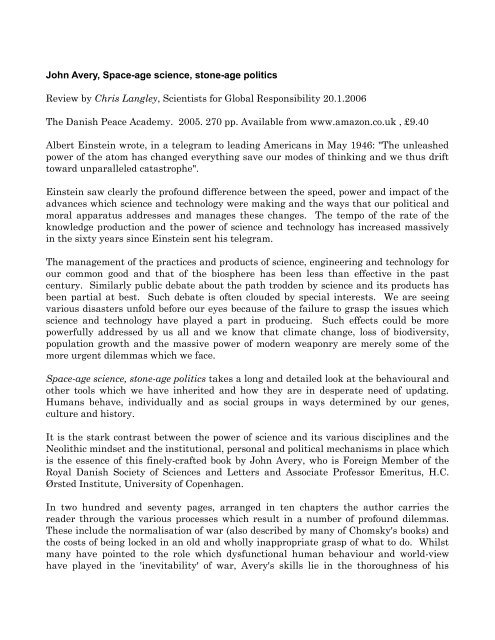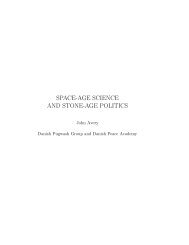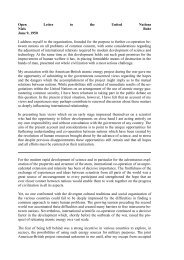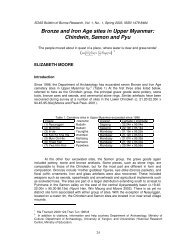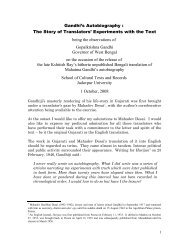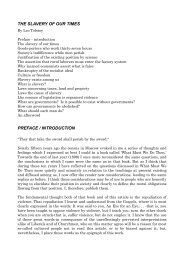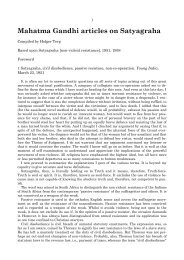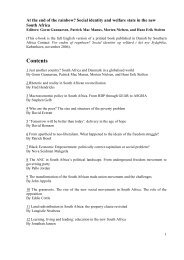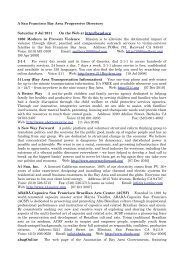John Avery, Space-age science, stone-age politics Review by Chris ...
John Avery, Space-age science, stone-age politics Review by Chris ...
John Avery, Space-age science, stone-age politics Review by Chris ...
You also want an ePaper? Increase the reach of your titles
YUMPU automatically turns print PDFs into web optimized ePapers that Google loves.
<strong>John</strong> <strong>Avery</strong>, <strong>Space</strong>-<strong>age</strong> <strong>science</strong>, <strong>stone</strong>-<strong>age</strong> <strong>politics</strong><br />
<strong>Review</strong> <strong>by</strong> <strong>Chris</strong> Langley, Scientists for Global Responsibility 20.1.2006<br />
The Danish Peace Academy. 2005. 270 pp. Available from www.amazon.co.uk , £9.40<br />
Albert Einstein wrote, in a telegram to leading Americans in May 1946: "The unleashed<br />
power of the atom has changed everything save our modes of thinking and we thus drift<br />
toward unparalleled catastrophe".<br />
Einstein saw clearly the profound difference between the speed, power and impact of the<br />
advances which <strong>science</strong> and technology were making and the ways that our political and<br />
moral apparatus addresses and man<strong>age</strong>s these changes. The tempo of the rate of the<br />
knowledge production and the power of <strong>science</strong> and technology has increased massively<br />
in the sixty years since Einstein sent his telegram.<br />
The man<strong>age</strong>ment of the practices and products of <strong>science</strong>, engineering and technology for<br />
our common good and that of the biosphere has been less than effective in the past<br />
century. Similarly public debate about the path trodden <strong>by</strong> <strong>science</strong> and its products has<br />
been partial at best. Such debate is often clouded <strong>by</strong> special interests. We are seeing<br />
various disasters unfold before our eyes because of the failure to grasp the issues which<br />
<strong>science</strong> and technology have played a part in producing. Such effects could be more<br />
powerfully addressed <strong>by</strong> us all and we know that climate change, loss of biodiversity,<br />
population growth and the massive power of modern weaponry are merely some of the<br />
more urgent dilemmas which we face.<br />
<strong>Space</strong>-<strong>age</strong> <strong>science</strong>, <strong>stone</strong>-<strong>age</strong> <strong>politics</strong> takes a long and detailed look at the behavioural and<br />
other tools which we have inherited and how they are in desperate need of updating.<br />
Humans behave, individually and as social groups in ways determined <strong>by</strong> our genes,<br />
culture and history.<br />
It is the stark contrast between the power of <strong>science</strong> and its various disciplines and the<br />
Neolithic mindset and the institutional, personal and political mechanisms in place which<br />
is the essence of this finely-crafted book <strong>by</strong> <strong>John</strong> <strong>Avery</strong>, who is Foreign Member of the<br />
Royal Danish Society of Sciences and Letters and Associate Professor Emeritus, H.C.<br />
Ørsted Institute, University of Copenh<strong>age</strong>n.<br />
In two hundred and seventy p<strong>age</strong>s, arranged in ten chapters the author carries the<br />
reader through the various processes which result in a number of profound dilemmas.<br />
These include the normalisation of war (also described <strong>by</strong> many of Chomsky's books) and<br />
the costs of being locked in an old and wholly inappropriate grasp of what to do. Whilst<br />
many have pointed to the role which dysfunctional human behaviour and world-view<br />
have played in the 'inevitability' of war, <strong>Avery</strong>'s skills lie in the thoroughness of his
description and his calm analysis of how we might change the process and build peace<br />
and security. The book points to the need to make use of a firm base of social justice and<br />
to relearn our role in the world. Given some of the limitations which we have inherited<br />
(both in our genes and the culture in which they interact) but conscious of how the power<br />
and tools of <strong>science</strong> can be brought to change the ways in which we frame our problems,<br />
the overall mess<strong>age</strong> of <strong>Space</strong>-<strong>age</strong> <strong>science</strong>, <strong>stone</strong>-<strong>age</strong> <strong>politics</strong> is a positive one, supported <strong>by</strong><br />
a variety of examples.<br />
The book opens with a challenging call to envis<strong>age</strong> some of the problems which we face<br />
and how things might be different given our abilities and inclinations. Many situations<br />
calling for only a slight change of perspective, whilst others need a profound<br />
reorientation. <strong>Avery</strong> asks us to simply pause and to think outside the box on matters<br />
which appear 'inevitable'. Security figures largely in the scenarios in this engaging<br />
chapter. Such brain storming throws up twenty-eight cameos which are explored in<br />
subsequent chapters. They range from military spending and poverty, the common but<br />
devastating diseases of poorer countries, to the need for better communication and<br />
tolerance. Areas familiar to readers of this Newsletter.<br />
<strong>Avery</strong> describes in elegant fashion our misguided views, so frequently supported <strong>by</strong> the<br />
scientific and technological communities, and how these, through economic globalisation,<br />
impact on the rest of the world. The disasters of Iraq, Africa and Afghanistan owe their<br />
initiation and continuation in some degree to the expertise of <strong>science</strong>, but <strong>by</strong> altering our<br />
perception we can as scientists, designers and engineers see how to play a role in<br />
changing these disasters into opportunities to share expertise and make a positive impact<br />
on global security in its various manifestations. The tools to start making a change are<br />
detailed in Chapter Nine which suggests the need for a re-direction of education toward<br />
building and maintaining peace.<br />
<strong>John</strong> <strong>Avery</strong>'s arguments are clear, pertinent and never shrill or simplified. As Camus<br />
wrote after the US bombing of Hiroshima and Nagasaki, and quoted on p<strong>age</strong> 111 of<br />
<strong>Avery</strong>'s book: "Our technical civilization has just reached its greatest level of sav<strong>age</strong>ry.<br />
We will have to choose, in the more or less near future, between collective suicide and the<br />
intelligent use of our scientific conquests".<br />
This excellent and well crafted book should be read <strong>by</strong> all who are in any way involved<br />
with <strong>science</strong> and technology. Especially those who teach the ethics and policy dimensions<br />
of the subject and those who are concerned <strong>by</strong> the profound changes which have come<br />
about in the culture and funding of <strong>science</strong>. Those from the research funders who read<br />
the book will find ways in which research might usefully be linked to the creation of a<br />
balanced and more equitable world. It is still not too late to change matters and to build<br />
an open and ethical <strong>science</strong>. This book should be in the tool-kit of all who wish to play a<br />
role in making such changes happen.


